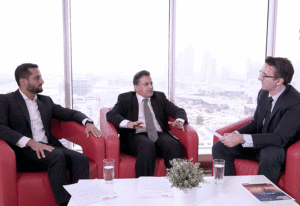
A wave of projects are planned in the region, but progress on some schemes is slow
The past five years have seen a wave of investment in transportation projects in the GCC as governments strived to meet the logistics needs of their booming economies. Today, in the wake of the global financial crisis, those projects are now playing an important role creating activity in an otherwise sluggish construction sector.
Table: GCC transport projects market ($bn) | |
|---|---|
| UAE | 50 |
| Saudi Arabia | 41.7 |
| Kuwait | 10.7 |
| Qatar | 46.5 |
| Bahrain | 7.5 |
| Oman | 14 |
| Sources: MEED; MEED Projects | |
According to regional projects tracker MEED Projects, there are $170bn-worth of transport projects planned or under way in the GCC. Some 12.3 per cent of this, or $20.9bn, is being invested in port projects, while 32 per cent, or $54.8bn, is being spent on airport schemes. But the bulk of the investment is being directed to railway projects. At present, some $94.5bn of rail schemes are planned or under way in GCC. This is equivalent to 55.5 per cent of the total expenditure currently earmarked for transport projects in the region.
Rail investment
The heavy investment in rail centres on the planned GCC railway, which will link each of the six member states. The UAE, Saudi Arabia, Qatar, Kuwait, Bahrain and Oman plan to design and build their own national railway networks, which will, when finished, link up to form the wider GCC railway.
The UAE’s $11bn Union Railway is already progressing, with an award due to be made in July for the study on the impact of sand dunes on the rail tracks and its mitigation.
The majority of transport projects under way in the GCC are in the UAE, accounting for 29.3 per cent of the total value. The schemes are divided between Dubai and Abu Dhabi and include Dubai metro, Abu Dhabi airport, Jebel Ali airport, the Union Railway and the $10bn Khalifa Port and Industrial Zone project. If the value of Abu Dhabi’s $68bn public transport masterplan were also included, the total value of transport projects in the UAE would rise to $118bn, far above the other five GCC countries.
The second largest transport market is Qatar, with $46.5bn-worth of projects planned or in progress. It accounts for 27.3 per cent of the Gulf’s transport market and has the single largest airport development under way in terms of value. The first phase of the $14.5bn New Doha International airport is due to be completed in 2011, and will have a capacity of 24 million passengers a year. This will rise to 50 million passengers a year when the entire project is finished in 2015.
Qatar also has a massive $25bn railway plan in the pipeline, which involves building a national railway line and a metro in Doha. The Urban Planning & Development Authority is also reviewing plans for an estimated $1bn sub-sea tunnel in Doha to link the financial centre with the New Doha International airport.
Saudi plans
Saudi Arabia is the other sizeable market in the region, with 24.5 per cent of the transport-related projects either planned or under way in the GCC. By far the main focus of the kingdom’s transport plans is on developing its railways, with $27.4bn-worth of projects on the cards. These include the $7bn Haramain railway, the $3bn Riyadh metro, an internal railway in Mecca and a 15-month study into building a metro in Jeddah.
One project already nearing completion is the North-South minerals railway that will be used to transport phosphate and bauxite from Jalamid in the northern region to processing sites in Ras al-Zour. This is scheduled to open at the end of 2010.
Saudi Arabia also has some of the region’s largest major airport projects, including the planned $2.4bn Medina airport and the $7bn airport at Jeddah.
The General Authority of Civil Aviation (Gaca) is currently finalising the list of companies prequalified to bid on work on Medina airport – the kingdom’s first airport to be built on a public-private partnership basis. Gaca also has $667m worth of domestic airport projects planned.
Meanwhile, the kingdom’s ports authority intends to privatise the country’s ports, and build a new port in Jeddah to handle rising food imports and support operations at Jeddah Islamic port.
Bahrain, Kuwait and Oman have much less investment directed towards transport infrastructure. Oman has 8.2 per cent of the Gulf’s transport projects under way and is focusing primarily on developing its main airports at Muscat and Salalah.
In terms of rail, the sultanate’s Supreme Committee for Town Planning is currently prequalifying firms for the design and project management contracts for the country-wide railway network.
France’s Systra and the local National Engineering Office have carried out a feasibility study for the scheme.
Kuwait accounts for just 6.3 per cent of the total value of transport projects in the GCC, worth a combined $10.7bn. Its plans include a metro system and major air and seaport projects.
Bahrain is the smallest transport market in the Gulf with 4.4 per cent of projects by value. The biggest scheme currently underway is the $4.7bn expansion of Bahrain International airport. The Works Ministry is also planning an 11-kilometre light transport system that will run from Bahrain airport through Manama and onto the Qatar-Bahrain Causeway.
Progress slow
But while transportation megaprojects are certainly creating opportunities for consultants and contractors looking for work in the region, the majority of the $170.4bn of schemes planned in the region are still in the design stage.
Several are struggling to move onto construction. In particular, Abu Dhabi’s metro and tram projects have yet to move beyond the tendering stage and work on Dubai’s Al-Sufouh tram has recently come to a standstill.
Dubai metro’s Green line has also been delayed due to changes in the design and in June, it emerged that the estimated $4bn Qatar-Bahrain Causeway is also on hold.
MEED Quality Awards for Projects 2011: Transport and Logistics Project of the Year
Ports, airport and railway projects have undergone some of the biggest growth in the region in recent years
Expansions, new facilities boasting the latest technologies have put the Gulf on the map in terms of trade and transportation.
MEED’s Transport and Logistics Project of the Year 2011 aims to reward those endeavours by benchmarking the highest quality developments and recognising the most sustainable practices.
Projects that can be nominated for this award include:
- Airport terminals, expansions and onsite or off-site logistics developments
- New ports or expansions to existing facilities
- Railway terminals, stations and tracks
Those submitting nominations for a transport project should use the official online entry form to supply information on the five factors in the delivery of the project:
- Economic and social feasibility
- Architecture and design
- Engineering
- Construction procurement and project management
- Environmental impact and sustainable development
Go to meed.com/awards for more information or to meedawards.com to enter the MEED Quality In Projects award for transport andlogistics project of the year
You might also like...

Partanna and Saudi firm tests carbon negative concrete
25 April 2024

Hassan Allam and Siemens confirm Hafeet Rail award
24 April 2024

UAE builds its downstream and chemical sectors
24 April 2024

Acwa Power eyes selective asset sales
24 April 2024
A MEED Subscription...
Subscribe or upgrade your current MEED.com package to support your strategic planning with the MENA region’s best source of business information. Proceed to our online shop below to find out more about the features in each package.








